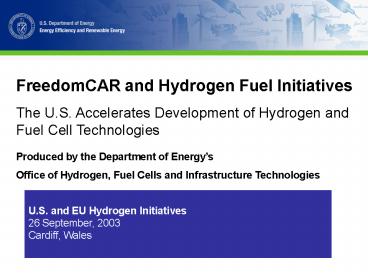FreedomCAR and Hydrogen Fuel Initiatives - PowerPoint PPT Presentation
1 / 16
Title:
FreedomCAR and Hydrogen Fuel Initiatives
Description:
so that the first car driven by a child born today could be ... Air Products ... dispensing of compressed hydrogen for vehicles and buses. Production ... – PowerPoint PPT presentation
Number of Views:20
Avg rating:3.0/5.0
Title: FreedomCAR and Hydrogen Fuel Initiatives
1
FreedomCAR and Hydrogen Fuel Initiatives The U.S.
Accelerates Development of Hydrogen and Fuel Cell
Technologies Produced by the Department of
Energys Office of Hydrogen, Fuel Cells and
Infrastructure Technologies
U.S. and EU Hydrogen Initiatives 26 September,
2003Cardiff, Wales
2
FreedomCAR Initiative Launched in January 2002
FreedomCAR and Hydrogen Fuel Initiatives
Hydrogen Fuel Initiative Launched in January
2003
- Secretary Abraham joins with leaders of General
Motors, DaimlerChrysler, and Ford in announcing
FreedomCAR at the North American International
Auto Show in Detroit. - January 9, 2002
"Tonight I am proposing 1.2 billion in research
funding ... so that the first car driven by a
child born today could be powered by hydrogen,
and pollution-free.
President George W. Bush 2003 State of the Union
Address January 28, 2003
Freedom from petroleum dependence, pollutant and
carbon dioxide emissions
3
Hydrogen from Diverse Domestic Resources can
reduce our demand for oil by over 11 million
barrels per day by the year 2040.
Why Hydrogen?
Transportation
Biomass
Biomass
Biomass
Hydro
Hydro
Hydro
HIGH EFFICIENCY RELIABILITY
Wind
Wind
Wind
Solar
Solar
Solar
Nuclear
H
2
Oil
Oil
ZERO/NEAR ZEROEMISSIONS
S e q u e s t r a t i o n
Coal
Coal
Natural
Natural Gas
Gas
4
Timeline for Hydrogen Economy
Commercialization Decision
5
Technical Barriers
- Hydrogen storage systems vehicle range must be
increased to 300 miles while meeting identified
packaging, cost, and performance requirements. - Hydrogen production and delivery cost of safe
and efficient hydrogen production and delivery
must be lowered enough to be competitive with
gasoline (1.50/gge untaxed) without adverse
environmental impacts. - Fuel cells must enable engine costs of less
than 50 per kilowatt (in high volume production)
while meeting performance and durability
requirements.
6
Hydrogen StorageGrand Challenge
In July 2003, DOE issued a Grand Challenge to
the scientific community proposals selected will
form the basis of a national project.
National Hydrogen Storage Project
University or Industry Lead
Centers of Excellence (National Lab Lead)
Testing Analysis Cross Cutting
Complex hydrides
New materials/concepts for on-board storage
Chemical hydrides
Compressed gas liquid hydrogen tanks
Carbon-based
Off-board storage systems
7
Hydrogen Production
8
Hydrogen Delivery
Pipeline
Goal Develop hydrogen fuel delivery
technologies that enable the introduction and
long-term viability of hydrogen as an energy
carrier for transportation and stationary power.
Truck
Gaseous
Onsite reforming
Liquid H2 - Pipeline - Truck - Rail
Liquid H2 Chem. Carriers
Hydrides
Other Carriers
9
Institutional Barriers
- Investment risk of developing a hydrogen delivery
infrastructure is too great, given technology
status and current demand. - Uniform model codes and standards to ensure
safety, insurability, and fair global competition
are lacking. - Local code officials, policy makers, and the
general public lack education regarding hydrogen
safety and benefits.
10
Hydrogen, Fuel Cells and Infrastructure
Technologies Program
Multi-year Research, Development Demonstration
Plan
EDUCATION
CODES STANDARDS
SAFETY
SYSTEMS INTEGRATION / ANALYSES
DELIVERY
TECHNOLOGY VALIDATION
FUEL CELLS
PRODUCTION
Economy
STORAGE
RESEARCH DEVELOPMENT
11
The Hydrogen Economy Is A Global Vision
The vision of the International Partnership for
the Hydrogen Economy is that a participating
countrys consumers will have the practical
option of purchasing a competitively priced
hydrogen power vehicle, and be able to refuel it
near their homes and places of work, by 2020.
Secretary of Energy Spencer Abraham, April 28,
2003
12
Additional Information Technical Progress
13
2003 Technical Accomplishments
- 3M Corporation developed a set of
high-performance, matched PEM fuel cell
components and pilot manufacturing processes
demonstrating high volume, high yield MEA
production.
- Brookhaven National Laboratory developed a new
electrocatalyst structure and deposition process
enabling higher activity for hydrogen oxidation
and CO tolerance than commercial
electrocatalysts. Low Pt loading of 0.06 g/kW
and Ru loading of 0.50 g/kW were achieved.
- McDermott demonstrated a large-scale,
fully-integrated multi-fuel processor on gasoline
to produce a fuel cell-quality gas containing 43
hydrogen.
14
2003 Accomplishments (contd)
Education Developed a comprehensive, long-term
plan to educate multiple audiences. Hydrogen
Storage Quantum Technologies developed 10,000
psi compressed hydrogen tanks achieving 6 wt H2,
1,050 W-h/L energy density, and 2,000 W-h/kg
specific energy.
- Technology Validation
- Air Products Chemicals, Inc., along with
partners Plug Power and the City of Las Vegas,
completed a 5-year project resulting in the
demonstration of a multi-purpose refueling
station with - on-site H2 production by reforming natural gas
- a 50 kW PEM fuel cell to generate electricity
and - dispensing of compressed hydrogen for vehicles
and buses.
15
Key Activities
Technology Validation (15.0M)
Production/Delivery (23.0M)
Fuel Processor RD (19.0M)
Storage (30.0M)
Stack Component RD (28.0M)
Infrastructure Validation (13.2M)
Distributed Energy Systems (7.5M)
Safety, Codes Standards and Utilization
(16.0M)
Transportation Systems (7.6M)
Education and Cross-Cutting (5.8M)
Technical Support (0.4M)
Total FY-04 Request 165.5M
16
Questions Answers
ARE THERE ANY QUESTIONS?
FOR ALL OF THE ANSWERS AND POINTS OF CONTACT, GO
TO WWW.EERE.ENERGY.GOV































